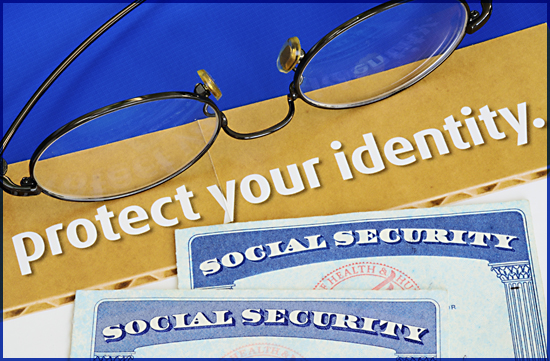Anyone can become the victim of an identity theft crisis, but many seniors are at a higher risk of identity theft than the general population. Many seniors are vulnerable to identity theft or scams due to their trusting nature and their confusion about modern day technology. When seniors do get their identities stolen, they may find it difficult to recover from the crisis and need help from their families to understand the entire crisis. Identity theft occurs when a thief steals a senior’s social security number, bank account numbers and other personal or financial documents. With this information, thieves can open new lines of credit, open new bank accounts, obtain professional licenses, and even obtain new birth certificates. At first, victims may not realize that they have been targeted. Victims may not realize they have been targeted until their credit is already ruined. To help protect your elderly loved ones from identity theft, keep reading to learn about tips and ways to keep them safe.
Buy a Shredder
A cross-cut shredder is a great addition to any senior’s home. With a cross-cut shredder, your loved one can shred all of their important documents that come in the mail. Any credit card offers, bank statements, or sensitive pieces of mail should be shredded in order to avoid identity theft. People who steal other people’s identities may go through your loved one’s trash at night in order to find important documents that they can use to steal your loved one’s identity. Shredding their sensitive mail can prevent identity theft and keep your loved ones safe.
Guard Credit Cards
Credit cards are a major culprit for identity theft. Waiters, sales people or anyone else who asks for your loved one’s credit card may be able to write down the numbers of your loved one’s card and use the card for online purchases. Also tell your loved ones to guard their cards at grocery stores and retail stores. When swiping their credit card or debit card they should always choose the credit option instead of the debit option. Choosing the credit option will allow the transaction to complete quickly and will not allow identify thieves to steal your loved one’s pin number.
Mail Letters at the Post Office
If your loved ones leave their outgoing mail in their own home mailboxes, then they may be putting themselves at risk for identity theft. Thieves can come to their home and take the mail out of their mailbox to obtain sensitive information such as their credit card number, social security number or their bank account number. Instead, your loved ones should mail their letters from the post office or from a mail box in their local community. This will drastically decrease their risk of getting their identity stolen.
Never Give Out Personal or Financial Information
Your loved ones should never give out personal or financial information over the phone. Telephone solicitors often offer people prizes or some type of rewards for their personal or financial information. They may also claim that they have a court document or papers from the police to serve to your loved ones. If this occurs, they may claim to need money in order to serve the papers. Remind your loved ones that they should never give out their information over the phone, and give them the numbers of their local police stations to report or check any weird calls they may receive.
Never Let Anyone Copy Their Driver’s License
Never allow anyone to copy your loved one’s driver’s license at a retail store. Your loved one may be asked for their license to verify a check or a credit card, but they should not need to have their license copied. With a copy of their license, anyone can access your loved one’s bank accounts and personal data. The only time that someone should copy their license is at a doctor’s office or a hospital for insurance purposes.
Keep Personal Information Locked Away in a Safe
Your loved ones should keep all of their personal and financial information locked away in a safe in their home. By locking away their birth certificates, social security numbers, and important documents they can keep all of their documents safe. In the slight case that someone may break into their house or a neighbor may visit and see documents sitting out, a safe is a great idea to keep documents put away and out of sight.
Don’t Sign the Back of Credit Cards
One of the best ways for seniors to protect themselves from identity theft is to not sign the backs of their credit cards. Instead, they can write the phrase “check ID” in order to signal to retailers and restaurant workers to check your loved ones’ IDs each time they use their credit card. This way, if their credit cards would be stolen, then the culprit may be caught early and not wrack up a lot of debt.
Getting your identity stolen is a horrible crisis that, unfortunately, affects thousands of people across the nation. Identity theft is one of the fastest growing crimes in developed countries since technology is so easy to access. Many identity thieves target seniors because they believe they are easy targets. Seniors are often socially isolated, lonely and tend to be very trusting of everyone they meet. Plus, many seniors may have issues with their memory, which puts them at a higher risk of identity theft. Scammers and identity thieves are constantly thinking of more and more ideas to steal the identities of older individuals. To protect your loved ones, read over these tips and talk with your elderly loved ones about ways that they can protect themselves. With these tips and your advice, you can help protect your loved ones from identity theft and to help them stay financially stable throughout their twilight years.

